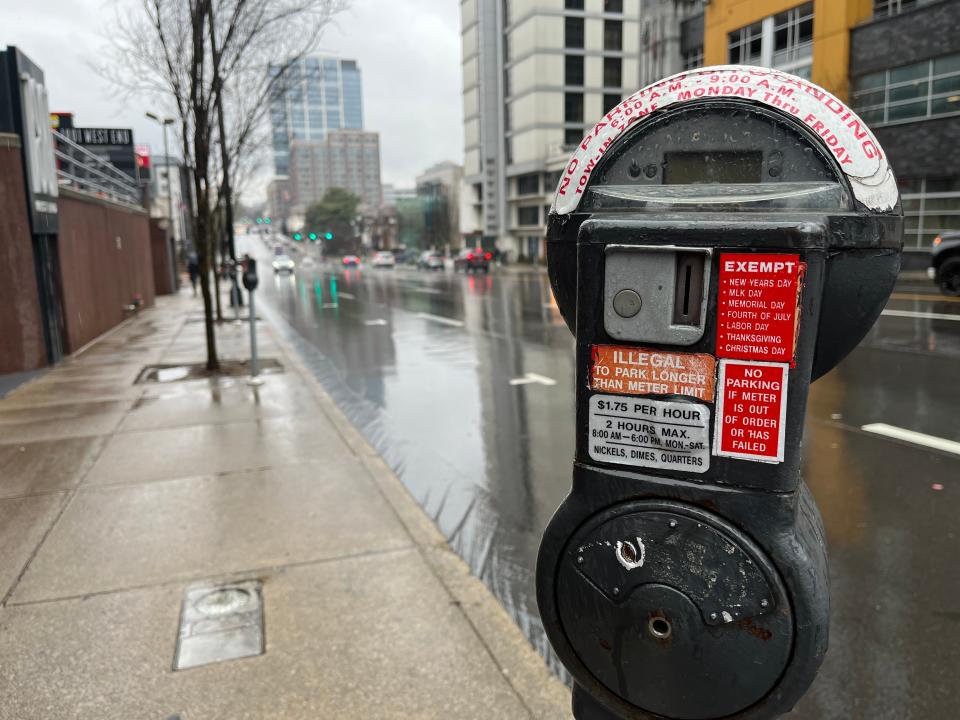$70 fines, time limits top growing pains in Nashville's smart parking push
Nashville's ongoing quest to modernize city parking has not come without growing pains.
Metro began replacing its roughly 1,300 coin-operated street parking meters in February with multi-space kiosks accepting coins, credit cards and payments via smart phones.
With the updated meters came 24/7 enforcement and a personnel boost to match, growing from six enforcement officers to 21. Metro also expanded the number of metered spaces within Nashville's urban core.
Other things remain the same, at least for now: Meter prices remain at $2.25 per hour in the central business district and $1.75 per hour outside that boundary. Nashville Department of Transportation spokesperson Cortnye Stone said some of the most acute pain points highlighted in the ongoing parking modernization push are not new at all.
More: Nashville's street parking system is smart, but still learning. Here's what's next.
The two-hour limit for Metro's metered spaces is long established, Stone said, though NDOT has recognized it was previously somewhat irregularly enforced. Parking violation fines were increased to $25 in 2019, but parking scofflaws now find themselves with $70 tickets. This is thanks to a $44 court processing fee set by state statute, according to Stone.
NDOT logged 321,000 transactions at the new meters as of September, totaling $1.44 million in revenue.
Though the new meters have made parking more convenient by eliminating the need to carry around a roll of quarters, Nashville Mayor Freddie O'Connell said in October that Metro has "seen difficulties" with musicians parking on-street for gigs, residents unable to park on-street overnight and business patrons exceeding the meters' two-hour cap — something O'Connell himself has experienced after returning to an establishment last-minute for a forgotten coat.
"We have since responded to suit to some of those things, but I think the next step is going to be to have treated this first phase as a pilot and see if we can apply some lessons learned," O'Connell said, indicating he'd like to revisit discussion about the two-hour limit.
The program was rolled out under a 5-year contract with Georgia-based LAZ Parking approved in November 2022, something O'Connell opposed during his tenure on Metro Council.
"While we wouldn’t necessarily characterize the Smart Parking Program as a pilot in the strictest sense of the term, we recognize that the program is new and we will need to make changes as we continue implementation," Stone said in a statement to The Tennessean. "We’re eager to continue working with the community, Mayor O’Connell, and Metro Council as we enhance technology, communication, and enforcement and make the program one that works for everyone in the city."

Parking meter time limits are intended to allow for "turnover" in business districts, Stone noted, adding that visitors who plan to park for longer periods should seek spaces in Metro's two parking garages.
Some meter time limits have been adjusted based on feedback from community members and business owners, she said.
NDOT Director Diana Alarcon said Metro is exploring the possibility of dividing downtown into smaller "zones," with each zone allowing a 2-hour maximum, to accommodate parkers who may have several errands in the area.
Meters in downtown, SoBro, Midtown, Edgehill, Hillsboro Village and Music Row now have a 3-hour parking maximum after 5 p.m. The Gulch has a 3-hour maximum, and the parking maximum on certain streets in "Gulch East" is extended to six hours after 6 p.m.
NDOT issued warning tickets from February through April, and now has a policy of granting a courtesy dismissal for first-time parking tickets.
O'Connell said it's "absolutely appropriate" for Nashville to value management of its curbs and public right of way.
"As we administer public inventory for spaces, I think we want to make it possible for people to enjoy food, entertainment, etc.," he said. "(I) certainly recognize that there's revenue there, but … I would say my goal is not for people to experience some kind of truly punitive fine afterward."
"We agree," Stone said. "We very much prefer compliance over punitive action."
This article originally appeared on Nashville Tennessean: $70 fines, time limits top smart parking growing pains in Nashville

